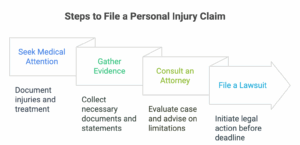Time can be a tricky thing, especially when you’re dealing with the aftermath of an accident. While you’re focused on healing and getting your life back on track, there’s a legal clock ticking. That clock is the statute of limitations, and understanding it can be the difference between recovering compensation for your injuries and losing your right to do so.
Understanding the Statute of Limitations in Personal Injury Cases
The statute of limitations is simply the deadline for filing a lawsuit. Every state has laws that set these deadlines for different types of legal claims, including personal injury. Miss the deadline, and the court will likely dismiss your case, regardless of its merits. Why? Statutes of limitations exist to ensure fairness, encourage timely resolution of disputes, and prevent cases based on stale or unreliable evidence.
What is a Personal Injury Claim and When Does the Clock Start?
A personal injury claim arises when you’re hurt due to someone else’s negligence or intentional actions. This could stem from a car accident, a slip and fall on someone’s property, medical malpractice, a defective product, or even assault.
Generally, the clock starts running on the date the injury occurred. For example, if you were injured in a car crash on July 1st, the statute of limitations would begin from that date. However, pinpointing the start date isn’t always straightforward.
The Statute of Limitations: A Deadline to Protect Your Injury Claim
The length of the statute of limitations varies depending on the type of injury and the state you’re in. Here’s a glimpse:
- Car Accidents: Many states, like California, have a two-year statute of limitations for car accident claims. Others, such as New York, allow three years.
- Medical Malpractice: These claims often have shorter deadlines. For instance, Texas has a two-year statute of limitations with some very specific conditions.
- Slip and Fall: Similar to car accidents, these usually fall under the general personal injury statute.
- Wrongful Death: These claims, filed on behalf of a deceased person, typically have their own specific statute, often shorter than general personal injury claims.

It’s crucial to know the specific statute of limitations in your state for your type of injury. A mistake here can be devastating.
Exceptions to the Rule: When the Statute of Limitations May Be Extended
While the statute of limitations is a firm deadline, there are exceptions. One important exception is the “discovery rule.” This rule applies when you don’t immediately discover your injury or its cause. In such cases, the clock might start running when you should have reasonably known about the injury and its connection to someone else’s actions.
For example, you might develop a medical condition years after being exposed to a toxic substance. The statute might begin when you’re diagnosed with the condition and realize it’s linked to that exposure, not when the exposure initially occurred.
Another exception can apply when the injured party is a minor. The statute of limitations may be paused until the minor reaches the age of majority (usually 18). Also, mental incapacitation can, in some cases, toll the statute of limitations.
How to Protect Your Rights and File a Personal Injury Claim Before Time Runs Out
Protecting your rights means taking prompt action. Here’s a simple checklist:
- Seek Medical Attention: Document your injuries and treatment.
- Gather Evidence: Collect police reports, photos, witness statements, and medical records.
- Consult an Attorney: A lawyer can evaluate your case, advise you on the statute of limitations, and guide you through the legal process.
- File a Lawsuit: If necessary, your attorney will file a lawsuit before the deadline expires.

Insurance adjusters might try to delay or deny your claim, hoping you’ll miss the deadline. They might offer a low settlement early on, or request endless documentation. Don’t fall for these tactics.
Seeking Legal Advice: Why You Need a Personal Injury Attorney to Navigate the Statute of Limitations
A personal injury attorney understands the complexities of the statute of limitations and can ensure your claim is filed correctly and on time. They can also investigate your case, negotiate with insurance companies, and represent you in court. Remember, the legal process can be complex, and navigating it alone can be risky. An attorney provides crucial experience.
Don’t Delay: Acting Promptly on Your Injury Claim is Crucial
Time is of the essence in personal injury cases. Delays can not only jeopardize your ability to file a lawsuit but can also weaken your case. Evidence can disappear, witnesses’ memories can fade, and it can become more difficult to prove your injuries were caused by the other party’s negligence. Furthermore, the longer you wait, the more difficult it may be to document the full impact of your injuries on your life.
Think of the case of Sarah, who was rear-ended in a car accident. She felt minor pain initially and didn’t seek immediate medical care. Six months later, her pain worsened, and she was diagnosed with a serious spinal injury. Because she delayed seeking treatment and legal advice, proving the accident caused her injury became more difficult.
Don’t let time run out on your injury claim. If you’ve been injured due to someone else’s negligence, consult with a personal injury attorney as soon as possible to protect your rights and pursue the compensation you deserve.






Good – I should certainly pronounce, impressed with your website. I had no trouble navigating through all tabs and related information ended up being truly simple to do to access. I recently found what I hoped for before you know it in the least. Quite unusual. Is likely to appreciate it for those who add forums or something, web site theme . a tones way for your customer to communicate. Nice task.